Shadows of the Novel: The Cult's Obsession
The night was shrouded in darkness, save for the flickering glow of neon lights. Young author, Elara, sat hunched over her laptop, her fingers dancing across the keys. Her latest novel, "The Cult of the Cult," had been released a mere week ago, and already it was causing a stir. The story, a blend of historical fiction and supernatural intrigue, had captivated readers with its intricate plot and haunting narrative.
Elara had poured her heart and soul into the novel, weaving together the tales of a secret cult and its fervent followers. She had never imagined that her creation would become an obsession for a group of fanatics who believed her story was more than fiction—it was their reality.
One evening, as Elara was reviewing the latest comments on her website, she noticed an influx of strange messages. They were from a cult known as "The Frantic Followers," a group that had taken her novel as a guidebook for their own lives. They spoke of prophecies, of a hidden world, and of the author's role in their destiny.

Elara dismissed the messages as fan fiction at first, but soon they began to escalate. The followers began to take her work more seriously, interpreting her words as literal instructions. They spoke of a "chosen one" who would lead them to a new world, a world free from the corruptions of the old.
The cult's leader, known only as "The Prophet," began to send Elara letters. In them, he claimed that her novel was a blueprint for a new age, and that she was the key to unlocking it. He demanded that she reveal the truth behind her creation, or face the consequences.
Elara's heart raced as she read the letters. She knew that the cult's obsession with her novel could lead to disaster. She was a writer, not a savior, and yet she felt an inexplicable connection to her characters and their world.
As the followers grew more fervent, Elara's life began to spiral out of control. She received anonymous threats, her home was vandalized, and she was hounded by reporters. The cult's obsession had become a viral sensation, and Elara was at the center of it all.
One evening, as she was leaving her apartment, a group of cultists confronted her. They were led by The Prophet, his eyes glowing with a fanatical intensity. "We know you're hiding the truth, Elara," he hissed. "And we will find it, even if it means destroying everything you hold dear."
Elara knew she had to act. She had to uncover the truth behind the cult's obsession and put an end to their madness. But as she delved deeper into the story of "The Cult of the Cult," she discovered that the truth was far more dangerous than she had ever imagined.
She learned that the novel had been inspired by a real-life cult from decades past. The cult had been led by a charismatic leader who had convinced his followers that he was the second coming of Christ. The leader's final prophecy had foretold the rise of a new cult, one that would fulfill his legacy.
Elara realized that she had inadvertently stumbled upon a modern-day version of this prophecy. The cultists were not just fanatics; they were followers of a twisted belief system that had the potential to turn into a dangerous cult of its own.
Determined to stop the cult, Elara embarked on a dangerous quest. She traveled to the cult's secret sanctuary, a hidden compound deep in the mountains. There, she faced the Prophet and his followers in a battle of wills and wits.
The climax of the story was a harrowing confrontation, where Elara had to use her knowledge of her own creation to outsmart the cult. She discovered that the novel was a complex puzzle, and her role in the cult's destiny was not as clear-cut as she had once thought.
In the end, Elara managed to break the cult's hold over her, but not without代价. She had to sacrifice her anonymity and her privacy to save others from the same fate she had narrowly avoided. The cult's obsession had become a part of her life, and she had to accept that her story was more than just words on a page—it was a reflection of the human condition.
As the story came to a close, Elara looked into the eyes of her readers, who had followed her journey through her novel. She realized that the power of storytelling was not just in the creation of worlds, but in the way it could touch the hearts and minds of others.
And so, Elara continued to write, her pen a tool of empowerment and enlightenment. She knew that the cult's obsession with her novel was just a symptom of a deeper problem—a world that craved meaning and connection. Her novels would always be a testament to the power of human imagination and the enduring quest for truth.
✨ Original Statement ✨
All articles published on this website (including but not limited to text, images, videos, and other content) are original or authorized for reposting and are protected by relevant laws. Without the explicit written permission of this website, no individual or organization may copy, modify, repost, or use the content for commercial purposes.
If you need to quote or cooperate, please contact this site for authorization. We reserve the right to pursue legal responsibility for any unauthorized use.
Hereby declared.









